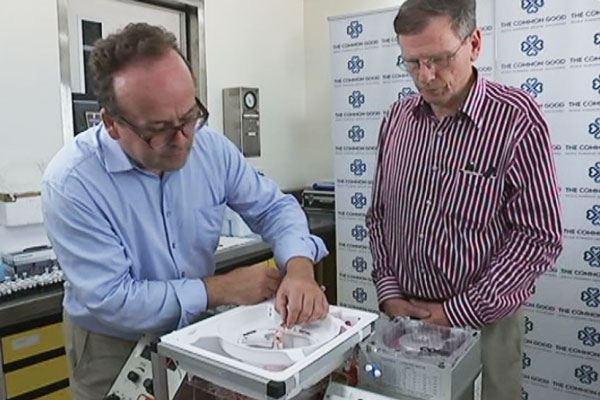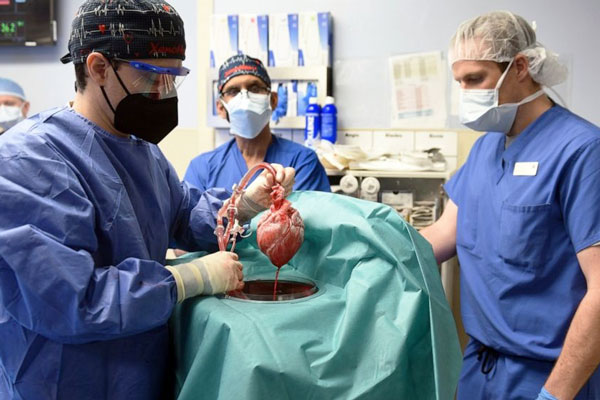
Prof John Fraser, Director, TPCH’s Critical Care Research Group, and Prof David McGiffin inspect the HEVP rig
TPCH’s Critical Care Research Group has been thanked by the American doctors behind the historic Pig-Human heart xenotransplant.
The surgery performed at the University of Maryland School of Medicine in January drew on the Critical Care Research Group’s world leading understanding of the use of hypothermic ex vivo perfusion (HEVP) which keeps a heart ‘alive’ and metabolically healthy between donor and recipient. For six years CCRG has been undertaking extensive preclinical trials into the use of HEVP, leading to the same technology being used in the world first surgery in Maryland.

The genetically modified donor pig heart is examined before transplantation in Maryland, USA.
During the years of lab preparations before the cardiac pig surgery, and after many unsuccessful heart transplants between species, University of Maryland surgeon Dr Bartley Griffith liaised with researchers at the Critical Care Research Group and implemented HEVP into his trials and quickly saw results. Inspired, his team then progressed with the successful pig heart to human transplant.
“For some time, I have been following CCRG’s impressive research and the subsequent clinical trials with great interest. Their preclinical results encouraged our use of the same system here and gave us confidence to move ahead with a transplant into a human,” said Dr Griffith.
CCRG Founder and Director Professor John Fraser, who devised the heart transplant research six years ago, said the technology had already been used in 13 human to human cases in Australia, transporting hearts that may otherwise not have been viable for transplantation.
“HEVP allows a donated heart to be rejuvenated before transplantation, essentially kept alive with a medical ‘Gatorade’ solution rich in oxygen and nutrients,” Professor Fraser said.
“The world is taking notice of Queensland’s innovative spirit and our many passionate and dedicated researchers. It’s something we should all take pride in, that the studies we have spent almost 100,000 hours doing to help transplant recipients in Australia have now been a key component to the world first pig transplant in America.”
“However, there’s still so much to learn – heart disease is the biggest killer and it just gets bigger and bigger. There are many more potential heart transplant recipients than donors.”
The University of Queensland’s Dr Louise See Hoe, who led the preclinical research at CCRG, said, “Organ shortage is the greatest challenge facing the transplant field today. Consequently, only a small number of patients with end-stage heart disease are given the opportunity of a transplant.”
“Our research recently secured a new world record with a heart kept alive via HEVP for over 7 hours before transplantation. This work will ensure Australians with heart disease will have a greater chance of survival and that we can increase the number of hearts available for transplant each year.”
Australian-led research into the use of HEVP and the first successful xenotransplantation heralds a new era for organ transplantation, a practice that has remained relatively unchanged in more than five decades.